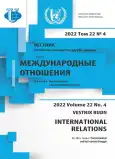Russia’s Soft Power in Africa: Potential and Challenges of Russian-speaking Women’s Communities
- 作者: Krylova N.L.1, Kulkova O.S.1
-
隶属关系:
- Institute of Africa of the Russian Academy of Sciences
- 期: 卷 22, 编号 4 (2022): Postcolonialism and Anti-colonial Struggle
- 页面: 728-740
- 栏目: THEMATIC DOSSIER
- URL: https://journal-vniispk.ru/2313-0660/article/view/320513
- DOI: https://doi.org/10.22363/2313-0660-2022-22-4-728-740
- ID: 320513
如何引用文章
详细
The article refers to one of the integral parts of the of Russian soft power foreign policy, which lies in its interaction with the Russian-speaking women’s communities on the African continent. This topic has not previously been given an appropriate consideration in the domestic scientific discourse. The processes of current social and political transformations in the African countries require the significant increase in soft power, which could become the instrument of developing and consolidating relations between Russia and new African elites and African people. The Russian-speaking communities in Africa and organizations they create are largely composed of women and are developing thanks to their own initiatives. The potential of Russian-speaking women’s communities in Africa, as well as of associations of African graduates of Soviet/Russian educational institutions as prospective soft power providers is quite significant, yet seriously underestimated and untapped properly. Today a variety of associations, clubs, fraternities, unions comprised of Russian-speaking women is widely occurring in the majority of African countries. There are such associations in Zambia, Cameroon, Tunisia, Algeria, Morocco, Nigeria, Uganda, Togo, Angola, Mauritius, Madagascar, Senegal, Nigeria, Rwanda, Mali, Congo, Côte d’Ivoire, Mozambique, and other countries. Russian-African mixed families are considered as the most probable potential mediators in Russian and African societies, cultures and markets. At the same time, the development of ties with the Russian-speaking diaspora in Africa would contribute not only to supporting the foreign policy activities of the Russian Federation on the continent, but also to the implementation of such important national priorities of our country as supporting compatriots abroad and promoting the “Russian world.” This acquires particular importance on the threshold of the second Russia - Africa summit in 2023.
作者简介
Natalia Krylova
Institute of Africa of the Russian Academy of Sciences
编辑信件的主要联系方式.
Email: krylovanl@yandex.ru
ORCID iD: 0000-0002-3788-0887
PhD, Dr. of Sc. (History), Chief Researcher, Centre for Sociological and Political Sciences Studies
Moscow, Russian FederationOlga Kulkova
Institute of Africa of the Russian Academy of Sciences
Email: kulkova-olga@yandex.ru
ORCID iD: 0000-0002-3953-8938
PhD (History), Senior Research Fellow, Centre for the Study of the Russian-African Relations and African States’ Foreign Policy
Moscow, Russian Federation参考
- Akulova-Konetskaya, T. V. (Ed.). (2012). Autographs of Bizerte. Diaries. Memories. Reflections. Moscow: Art-Volkhonka publ. (In Russian).
- Ayé-Pimanova, T. (1982). Bibliographie de la Côte d’Ivoire. Vol. 5, pt. 1: Sciences de l’homme, exceptée l’economie, 1970-1982. Abidjan: Universite d’Abidjan.
- Clifford, C., & Gruzd, S. (2022). Russian and African media: Exercising soft power. South African Institute of International Affairs Policy Insights, (125), 1-18.
- Davidson, A. B, & Mazov, S. V. (Eds.). (1999). Russia and Africa. Documents and materials. 18th Century - 1960. Vol. II: 1918-1960. Moscow: Institut vseobshchei istorii RAN publ. (In Russian).
- Gorelik, B. M. (2004). Russian diaspora in Africa. Assimilation or adaptation? Asia and Africa Today, (5), 57-61. (In Russian).
- Gorelik, B. M. (2007). Russian immigration to South Africa: Yesterday and today. Moscow: Institut Afriki RAN publ. (In Russian).
- Karaganov, S. A. (Ed.). (2021). Africa: Development prospects and recommendations for Russia’s policy. Moscow: Mezhdunarodnye otnosheniya publ. (In Russian).
- Konstantinova, O. V. (2020). Prospects for the development of Russian-African cooperation in the cultural and humanitarian sphere. Journal of the Institute for African Studies, (3), 5-14. (In Russian). https://doi.org/10.31132/2412-5717-2020-52-3-5-14
- Krylova, N. L. (2006). Afro-Russians: Marriage, family, fate. Moscow: ROSSPEN publ. (In Russian).
- Krylova, N. L. (2017a). Le centre Perevalnoe et la formation de militaires en Union Sovietique. Cahiers d’Etudes Africaines, (226), 399-417.
- Krylova, N. L. (2017b). Women’s associations in Africa as a form of political, economic and socio-cultural self-expression. Vostok. Afro-Aziatskie Obshchestva: Istoriia i Sovremennost, (3), 210-217. (In Russian).
- Krylova, N. L. (2018). “Russian African women” in the 20th century. Family. The fate. Homeland. Moscow: Institut Afriki RAN publ. (In Russian).
- Krylova, N. L. (2019). Soviet African wife (portrait of the “Cold War era”). Journal of the Institute for African Studies, (4), 127-140. (In Russian).
- Kulkova, O. S. (2021). Russian soft power in the North-East Africa. Politics and Religion Journal, 15(1), 105-130. Retrieved from http://politicsandreligionjournal.com/index.php/prj/article/view/213/239
- Laruelle, M. (2021). Russia’s soft power: Sources, targets and channels of influence. Zapiski Ifri. Russie.NEI.Visions (IFRI), (122), 1-30. (In Russian). Retrieved from https://www.ifri.org/sites/default/files/atoms/files/laruelle_russia_soft_power_ru_2021.pdf
- Limonier, K., & Laruelle, M. (2021). Russia’s African toolkit: Digital influence and entrepreneurs of influence. Orbis, 65(3), 403-419. https://doi.org/10.1016/j.orbis.2021.06.005
- Makhrov, K. V. (2008). Russian colony in Tunisia 1920-2000. Moscow: Russkii put’ publ. (In Russian).
- Makhrova, G. A. (2008). Russian churches in Tunisia. In K. V. Makhrov (Ed.), Russian colony in Tunisia 1920-2000 (pp. 172-175). Moscow: Russkii put’ publ. (In Russian).
- Pichon, E., & Russell, M. (2019). Russia in Africa: A new arena for geopolitical competition. EPRS: European Parliamentary Research Service Report, 1-12.
- Rutland, P., & Kazantsev, A. (2016). The limits of Russia’s ‘soft power’. Journal of Political Power, 9(3), 395-413. https://doi.org/10.1080/2158379X.2016.1232287
- Sukhov, N. V. (2009). From Russia to Morocco with a wife and a diploma (practice view). In V. V. Gribanova (Ed.), Africans in Russia: Education, marriage, family (pp. 105-112). Moscow: Institut Afriki RAN publ. (In Russian).
- Sukhov, N. V. (2019). History of Russian emigration in Morocco in the 20th century. Мoscow: Institut vostokovedeniya RAN publ. (In Russian).
- Sukhova, E. E., & Sukhov, N. V. (2019). Bibliographic dictionary of Russian emigration in Morocco in the 20th century. Мoscow: Institut vostokovedeniya RAN publ. (In Russian).
- Trunkos, J. (2021). Comparing Russian, Chinese and American soft power use: A new approach. Global Society, 35(3), 395-418. https://doi.org/10.1080/13600826.2020.1848809
- Wilson, J. L. (2015). Russia and China respond to soft power: Interpretation and readaptation of a western construct. Politics, 35(3-4), 287-300. https://doi.org/10.1111/1467-9256.12095
补充文件









